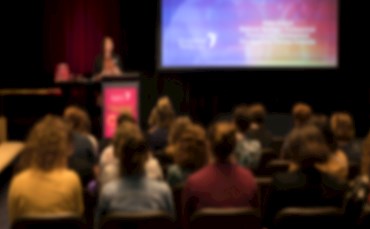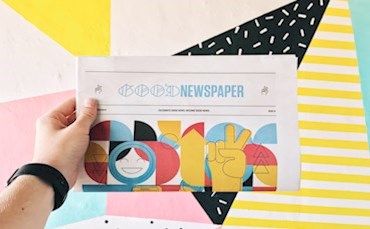Reconciliation
Occupational Therapy Australia acknowledges and pays respect to the past, present and future Traditional Custodians and Elders of this nation and the continuation of cultural, spiritual and educational practices of Aboriginal and Torres Strait Islander peoples.
Aboriginal and Torres Strait Islander people are warned that the following webpage may contain images or voices of deceased persons.
OTA’s statement on the Voice Referendum for Constitutional change
As a diverse and dedicated community of occupational therapists, we stand united in our passion for making a positive impact on the lives of individuals, families, and communities across this great continent we call home.
Occupational Therapy Australia is a community built on shared values, compassion, and a deep commitment to promoting inclusion and occupational participation in society. Our journey is one of continuous learning, and we are steadfast in our dedication to fostering deep mutual respect and understanding of the diverse cultures that enrich our nation.
As we tread the path towards a just and equitable future, we embrace the responsibility to strengthen our relationships with Aboriginal and Torres Strait Islander individuals, communities, and peak bodies, recognising the importance of reconciliation in our actions and policies.
Together, we champion the principles of self-determination, occupational justice, and participatory democracy. We are proud to stand in solidarity with our Aboriginal and Torres Strait Islander colleagues, accepting the invitation offered through the Uluru Statement from the Heart and supporting the Voice Referendum for Constitutional change.
With your unwavering support and dedication, we look forward to shaping a brighter future for occupational therapy in Australia, leaving a lasting impact on the lives of those we serve.
OTA’s statement: Occupational Therapy Australia supports the Voice Referendum for Constitutional change
Occupational Therapy Australia acknowledges the Traditional Owners of the unceded lands, and waterways where we conduct our business, where we meet and connect and where we live and work across this continent now also known as Australia. We pay our deepest respect to Elders past, present and emerging, for they are the custodians of knowledges, the traditions, the culture and generational foresight of our nations. We acknowledge that these lands have been inhabited by original custodians who have existed since time immemorial and continue to live in spiritual and sacred relationships with Country.
As occupational therapists living and practicing on unceded lands we have obligations. These include both moral and ethical obligations to act in ways consistent with our deeply held professional concern with the rights of all persons to inclusion and occupational participation in society. Accordingly, concerns with self-determination and the advancement of occupational justice – as the broader societal focus of occupational therapy – underpins our efforts in aligning in solidarity with Aboriginal and Torres Strait Island peoples in achieving constitutional change through the Voice. Our standpoint is that the Voice represents the most powerful vehicle for the realisation of participatory democracy in Australia to date.
Occupational Therapy Australia’s journey is one of continuous learning and deeper connectedness to culture and Country. Our vision is to develop deep mutual respect and strengthened relationships between our Board, staff and members and First Peoples ways of knowing and doing so that we can contribute to a shared and reconciled journey towards a just and equitable future. OTA recognises the importance of intentionally establishing sovereign relationships with Aboriginal and Torres Strait Islander individuals, communities and peak bodies and complements our ongoing commitment to reconciliation through our Reconciliation Action Plans.
Occupational Therapy Australia stands with our Aboriginal and Torres Strait Islander members, stakeholders and allies, and accepts the invitation offered through the Uluru Statement from the Heart. We support the yes vote for Constitutional change to establish a First Nations Voice.
Professor Carol McKinstry
President, Occupational Therapy Australia
"Gaka Yapameyepuka"
Our reconciliation artwork, is called 'Gaka Yapameyepuka,' meaning 'Come Together' in Yorta Yorta language.
Painted by artists Luke and Siena Tieri from Bayadherra, the artwork depicts the collaboration and connection between Occupational Therapy Australia and Aboriginal and Torres Strait Islander communities, encouraging cultural awareness and engagement to strengthen relationships and contribute to reconciliation.
The two large yarning circles depict OTA and Aboriginal and Torres Strait Islander communities. The four smaller yarning circles depict the stages of reconciliation and are connected by learning pathways. The large yarning circles are connected by 2 solid purple lines and 2 dashed yellow lines: The purple lines represent the completion of reflect and the yellow lines represent the process of working towards innovate, stretch and elevate. This reconciliation journey is ongoing and strengthens cultural connections between OTA and traditional custodians.
The circular artwork design symbolises the impact and outreach of reconciliation within OTA offices across Country, and the holistic approach to patient healthcare and wellbeing. All six circles acknowledge the physical, mental, emotional, spiritual, biological and social aspects of client wellbeing and also depict the six OTA values. The smaller circles around the outside of the artwork represent waterholes as a meeting place. This depicts OTA support networks and Aboriginal and Torres Strait Islander communities across Country contributing to access, equality and inclusion. These waterholes surround the central RAP process reflecting OTA's commitment to reconciliation.
Aboriginal and Torres Strait Islander people share a deep connection with the lands and waters of Australia that spans back over 60,000 years. As a relatively new profession and association we have a responsibility, a duty and a commitment to reconciliation and to growing greater understanding.
Our journey to understanding strives to be one of continuous learning and deeper connectedness to culture and country. Developing deep mutual respect and relationships, our Board, staff and members can join and contribute to a shared and reconciled journey towards a just and equitable future.


Reconciliation Action Plan (RAP)
Our commitments to Australia’s first peoples are outlined in our ‘Reflect’ Reconciliation Action Plan (RAP). As guided by Reconciliation Australia, there are four types of RAPs that organisations can develop: Reflect, Innovate, Stretch and Elevate. Each RAP is designed to suit an organisation at different stages of their reconciliation journey. Click here to read OTA’s ‘Reflect’ RAP.
To ensure our association is a culturally safe and welcoming organisation for Aboriginal and Torres Strait Islander people we need to create space for conversation and collaboration, for learning and sharing. Our Reflect RAP is the culmination of work from multiple groups and individuals invested in producing a meaningful roadmap for OTA’s reconciliation actions. We acknowledge and value all parties for lending their time and their cultural and/or clinical knowledge to this journey, including:
- RAP Development Group—represented by First Nations occupational therapists, members, non-members, Board and Indigenous Allied Health Australia and NATSIOTN representation
- Staff, Board members and RAP Development Group members through a planning workshop day at Koori Heritage Trust facilitated by an Aboriginal and Torres Strait Islander consultant
- Internal RAP Working Group—representation from across OTA’s teams to continue our learning, and to explore how to operationalise the activities of the Reflect RAP
- OTA staff who have committed to and completed a range of cultural responsiveness training courses
- OTA Board for their contribution, endorsement and support
- External review of the Reflect RAP draft by a RAP consultant to assist with Reconciliation Australia compliance prior to submission for endorsement
What is OTA doing?
The key expectations of starting with a Reflect RAP are to look inwards at the association, assess the readiness for reconciliation, establish effective governance structures, and determine the organisation’s vision for reconciliation. A key element during the Reflect RAP is to build understanding of who, how, why, and when to seek guidance and consultation, and to improve relationships with Aboriginal and Torres Strait Islander peoples.
A detailed and comprehensive report has been provided to Reconciliation Australia to demonstrate the deliverables against the actions set out in OTA’s Reflect RAP. Completing our first Reflect Reconciliation Action Plan is another step we take to solidifying our commitment to reconciliation, developing OTA’s and our journey to understanding.
These are some of the actions OTA has taken through implementing our Reflect RAP:
- Developed and implemented Cultural Protocols for OTA, our staff, Board, members and committees to provide guidance and direction
- Curated an interactive Reconciliation Space at our OT Exchange event held in June 2022 in Melbourne
- Introducing an internal staff resource hub of videos, documents, current issues, guides and inductions for the reconciliation work of the association and embedding practices
- Board Executive training with Bundyi Girri Consulting and Cultural Competence training opportunities for staff and members
To read more about the actions, click here to download our Reflect RAP Summary Report (June 2021 – June 2022).
We are motivated to continue this transformative work by commencing the development of an Innovate Reconciliation Action Plan for endorsement with Reconciliation Australia as per the framework in 2023. To develop this plan, we will be drawing on the recommendations, insights and suggestions provided by members, partners and stakeholders and expanding on the opportunities we can implement to support and guide the profession. We will look for further member engagement as we progress.

Stories
Gallery

National Conference 2019
National conference, held in Sydney

OTX2022
In-person conference held in Melbourne
Contact Us
We’d love to hear from you if you wish to lend your voice or experience to our reconciliation actions and deliverables or wish to be involved in the development of our next RAP. Please contact us to find out more.







.jpg)







